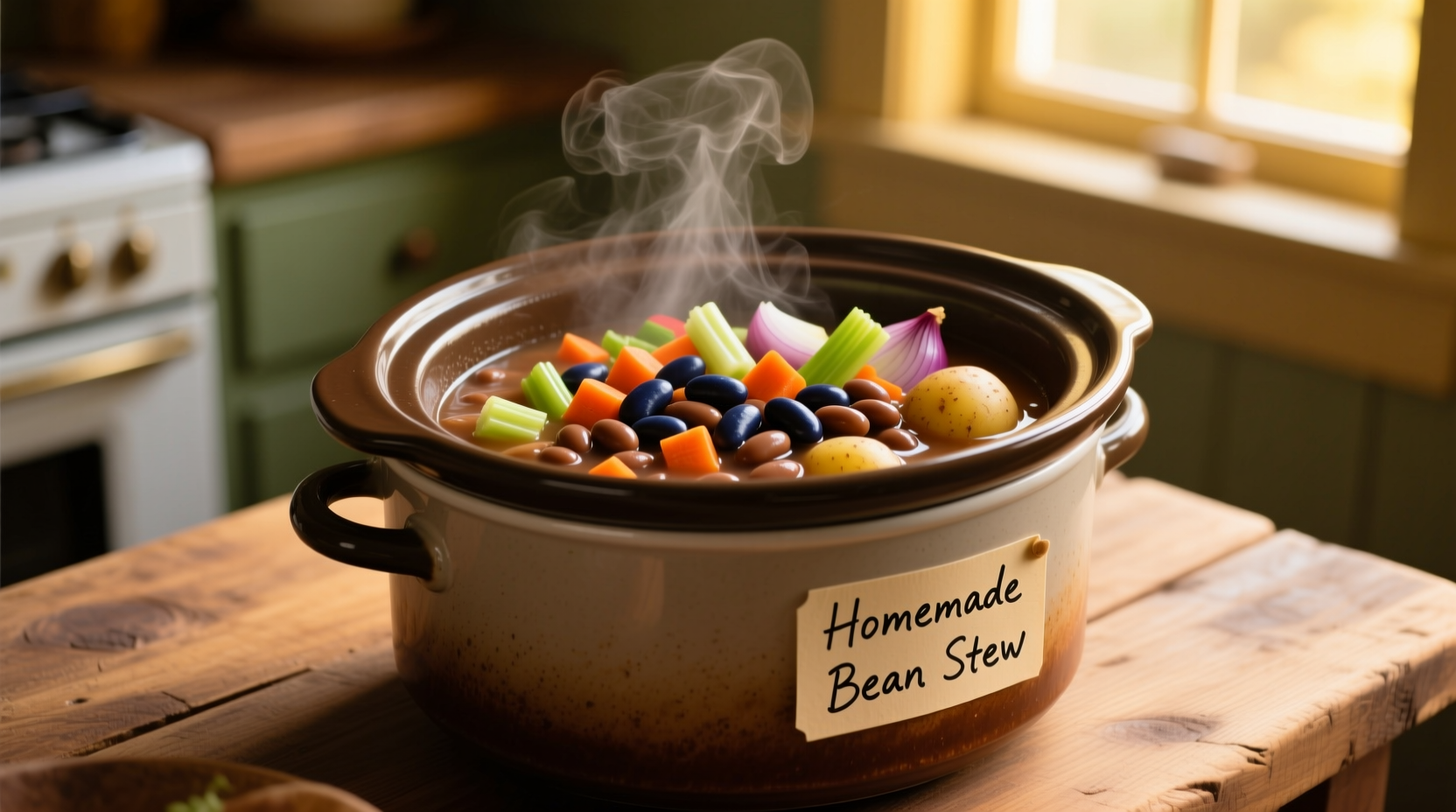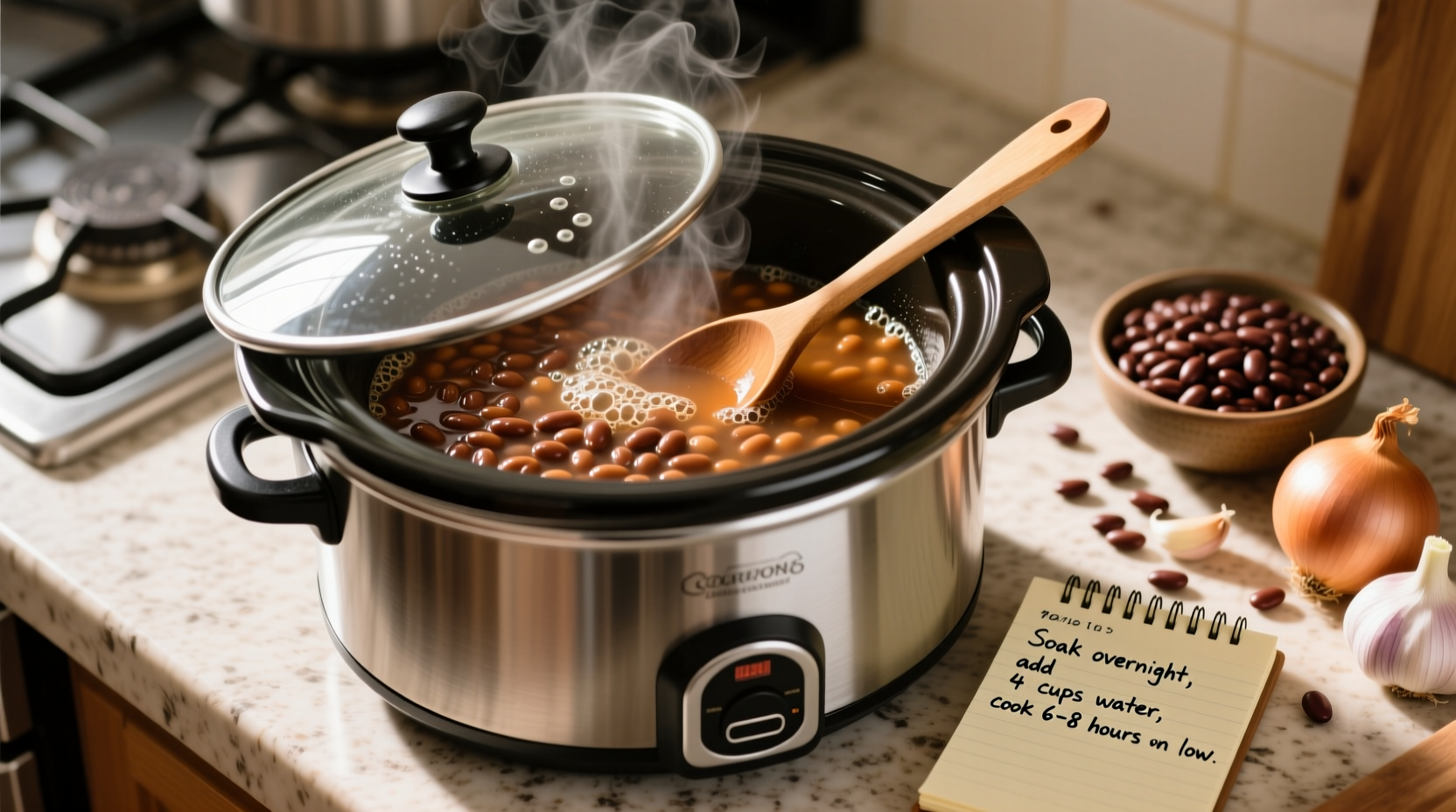Start with 1 pound (2 cups) of dried brown beans, sorted and rinsed. Add to your crock pot with 8 cups of water or broth, 1 chopped onion, 2 minced garlic cloves, and 2 bay leaves. Cook on LOW for 6-8 hours or HIGH for 3-4 hours until tender. No pre-soaking required for this foolproof method that delivers perfectly creamy beans every time.
There's nothing quite like the rich, earthy flavor of slow-cooked brown beans. As a professional chef who's taught thousands of home cooks how to maximize flavor through proper technique, I've perfected this no-fuss crock pot method that eliminates the guesswork. Forget the days of rock-hard beans or mushy disasters—this approach delivers consistently creamy results with minimal effort.
Why Your Crock Pot Is the Secret Weapon for Perfect Brown Beans
Slow cooking transforms dried beans into a nutritious, protein-packed staple with minimal active time. Unlike stovetop methods that require constant monitoring, your crock pot maintains a consistent, gentle heat that breaks down bean fibers without causing splitting. According to National Center for Home Food Preservation research, the consistent low temperature of slow cookers (typically 170-280°F) is ideal for rehydrating dried legumes while preserving their nutritional value.
| Cooking Method | Active Time | Total Time | Texture Consistency |
|---|---|---|---|
| Crock Pot (LOW) | 10 minutes | 6-8 hours | Uniformly creamy |
| Crock Pot (HIGH) | 10 minutes | 3-4 hours | Slightly firmer |
| Stovetop | 30+ minutes | 1.5-2 hours | Inconsistent |
| Pressure Cooker | 15 minutes | 45 minutes | Very soft |
Step-by-Step Cooking Process
Preparation: Setting Yourself Up for Success
Begin with high-quality dried brown beans—avoid any that appear shriveled or discolored. While traditional methods require overnight soaking, modern slow cookers eliminate this step thanks to their extended cooking time. Simply sort through your beans to remove any debris or damaged pieces, then rinse thoroughly under cold water.
Pro Tip: Add 1-2 tablespoons of apple cider vinegar to your cooking liquid. The slight acidity helps break down complex sugars that cause gas, making beans more digestible without affecting flavor. This technique, validated by University of Minnesota Extension research, improves texture while reducing digestive discomfort.

Layering Ingredients for Maximum Flavor
Add your rinsed beans to the crock pot first, followed by:
- 8 cups water or low-sodium vegetable broth (use broth for richer flavor)
- 1 large onion, chopped
- 3-4 garlic cloves, minced
- 2 bay leaves
- 1 teaspoon dried thyme
- 1-2 tablespoons apple cider vinegar
Critical Note: Never add salt during the initial cooking phase. Sodium can prevent beans from softening properly. Wait until the final hour of cooking to season with salt—this simple timing adjustment makes the difference between tender and tough beans.
Perfect Cooking Time and Temperature Guide
Cover and cook on your preferred setting:
- LOW setting: 6-8 hours for ultra-creamy texture
- HIGH setting: 3-4 hours for slightly firmer beans
Beans are done when they're tender but still hold their shape. Test by blowing on a spoonful—if the skins wrinkle slightly, they're perfectly cooked. The USDA Food Safety and Inspection Service recommends cooking dried beans to an internal temperature of at least 180°F to ensure food safety and proper texture development.
Troubleshooting Common Issues
When Beans Won't Soften
If your beans remain hard after the recommended time, consider these factors:
- Old beans: Dried beans lose moisture over time. For best results, use beans purchased within the last year.
- Hard water: Minerals in hard water can inhibit softening. Try using filtered water next time.
- Acidic ingredients: Tomatoes or vinegar added too early prevent softening. Add acidic elements during the last hour.
Fixing Common Texture Problems
Too much liquid? Remove beans with a slotted spoon, then boil remaining liquid on stove until reduced to desired consistency.
Not creamy enough? Mash 1 cup of cooked beans and stir back into the pot to naturally thicken the broth.
Serving and Storage Guidelines
For best flavor development, let beans sit covered for 15-20 minutes after cooking before serving. Stir in salt to taste (about 1½ teaspoons), along with any fresh herbs like parsley or cilantro. A splash of good quality olive oil or a squeeze of fresh lemon juice brightens the earthy flavors beautifully.
Storage: Cool completely before transferring to airtight containers. Properly stored in the refrigerator, cooked beans keep for 5-7 days. For longer storage, freeze in portion-sized containers for up to 6 months—this is my favorite meal prep strategy for quick weeknight dinners.











 浙公网安备
33010002000092号
浙公网安备
33010002000092号 浙B2-20120091-4
浙B2-20120091-4